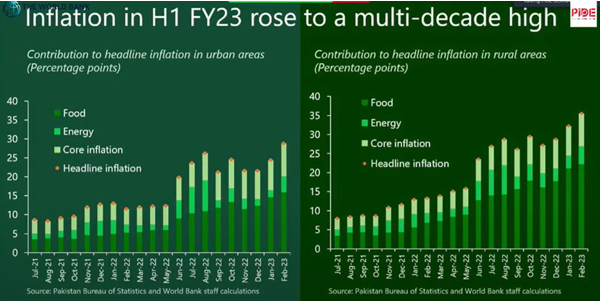INP-WealthPk
Ayesha Mudassar
Pakistan’s headline inflation rose to a multi-decade high in the first half of the Fiscal Year 2023 (H1FY23), reflecting global commodity shock, currency depreciation, tight monetary policy stance, supply disruptions due to the catastrophic flooding 2022, and reversal of unsustainable fuel and energy subsidies, said World Bank Senior Economist Adnan Ashraf Ghumman while presenting Pakistan Development Update: Recent Economic Developments, Outlook, and Risks in Islamabad.
As per the update, the country’s inflation during H1FY23 reached an average of 25.0 percent compared to 9.8 percent during H1FY22. The increase in prices was wide-ranging, with all product categories except communication services recording higher inflation. Across product categories, inflation for transportation registered a rapid expansion of 55.2 percent in H1FY23 compared to 15.1 percent in H1 FY22. Moreover, energy inflation was recorded at 40.6 percent in urban areas and 41.9 percent in rural areas, compared to 25.1 and 22.7 percent, respectively, during H1FY22.
Meanwhile, food inflation sharply grew in H1FY23. The prices of food and non-alcoholic beverages increased greatly from 9.6 percent in H1FY22 to 32.2 percent in H1FY23. Item-wise analysis exhibits that the highest price hike has been witnessed for meat, fresh fruit, cooking oil/ghee, pulses, and fresh vegetables. This sharp increase in food prices was mainly attributed to the torrential rainfall that significantly affected crop output and increased agricultural producers’ input costs.
On a monthly basis, headline inflation rose to 31.5 percent in February 2023 – the highest monthly inflation in more than four decades. While examining the factors contributing to headline inflation in urban and rural areas, persistently high energy and fuel prices are observed as the major factors.

Both urban and rural energy prices recorded a sudden hike in February, indicating the recent fuel and electricity tariff adjustments. Similarly, both rural and urban food inflation increased considerably, illustrating the ongoing climate change phenomenon.
Credit: Independent News Pakistan-WealthPk



